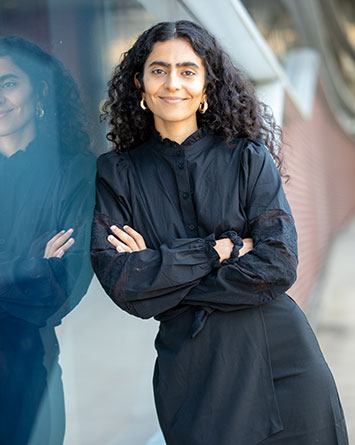
IST researchers on the graduate level are pushing the boundaries of technological solutions, and that is majorly enabled through its highly multidisciplinary faculty who are conducting research across a wide range of topics.”
Fast Facts
- IST program: Ph.D. in Information Sciences and Technology
- Faculty adviser: Carleen Maitland
- Primary research area: I pursue technologies for social impact in order to support the lives of refugees and migrants in the context of their new host countries
- Before IST: M.S. in Architecture, Stuckeman School of Architecture, Penn State; B.A. in Architectural Engineering, University of Tehran, Iran
- Hometown: Tehran, Iran
- Best place to eat on or near campus: Tadashi downtown, for sushi or ramen.
- Best Creamery flavor: It’s always a choice between Bittersweet Mint or Peanut Butter Cup. Bittersweet Mint usually wins!
- Fun fact: I know a little too much about Persian rugs—their different materials and weaves, and their pattern origins. As an Iranian my parents loved going to the Bazaar to research different rugs. In our culture, rugs are a centerpiece and tell a story about the family. Sometimes you grow old with a rug that has stayed in the family for generations.
Meet Nasim
Why did you choose to study at IST at Penn State?
IST researchers on the graduate level are pushing the boundaries of technological solutions, and that is majorly enabled through its highly multidisciplinary faculty who are conducting research across a wide range of topics. Specifically, I chose IST because of its attention to the social impacts of technology, where the goal is to navigate the information space to serve the wellbeing of individuals and societies.
Tell us about your research.
I focus on forced migration crises and the information practices of refugees and refugee-led organizations hosted in low and middle-income countries such as Kenya, Uganda, Malaysia and Indonesia. Currently, more than 80 million people are displaced worldwide, and 85% of them are hosted in low and middle-income countries or in remote areas where access to Information Communication Technologies (ICT) is limited. Despite these challenges, refugees have come together to form grassroots refugee-led organizations and are creating information hubs for refugees in areas of advocacy, health, education, and career development. I am using human-centered methods, which includes conducting qualitative interviews with refugee leaders, to explore how these organizations are using ICTs, which ICTs are beneficial to them, and which strategies can be used to promote ICTs to support refugee-led initiatives. My goal is to create more visibility for refugee-led organizations that are assets to their communities and essential actors in the localization of humanitarian aid.
Why is your research important?
In the past decade alone, 6.7 million Syrians, 4 million Venezuelans, 6.6 million Ukrainians, 2.6 million Afghans, 2.2 million South Sudanese, and 1.1 million people from Myanmar have been displaced across international borders. This makes forced migration one of the biggest challenges of our time, and we need to support sustainable community-based solutions that mobilize communities in the context of their new host countries. Technologies are part of the solution; they can help us make progress towards the United Nations’ Sustainable Development Goals by reducing inequality and creating conditions for safe migration.
Who is your biggest mentor?
My adviser, Dr. Carleen Maitland. She has inspired me to be resilient against all difficulties and truly find my vocation and passion during my Ph.D. program. More importantly, she helped me to be grounded, develop expertise in a completely new field where I could conduct impactful research, take on responsibilities, and create professionalism to connect and work with stakeholders outside of academia. I believe what really makes Carleen a great mentor for me is our mutual trust and understanding. I have learned that to be the key element in any mentor-mentee relationship.
What are your future career goals?
I would like to follow my passion in international development for social impact. I am hoping to pursue a career with international organizations where I can apply my skills in human-centered design and ICT research to minimize the digital divide and create inclusive sustainable solutions for all.
What is your favorite thing about IST?
You can meet people from different cultural backgrounds and professional experiences. During my time at IST, I have enjoyed developing a network of multidisciplinary researchers with a wide range of interests and backgrounds.
Last updated November 2022
